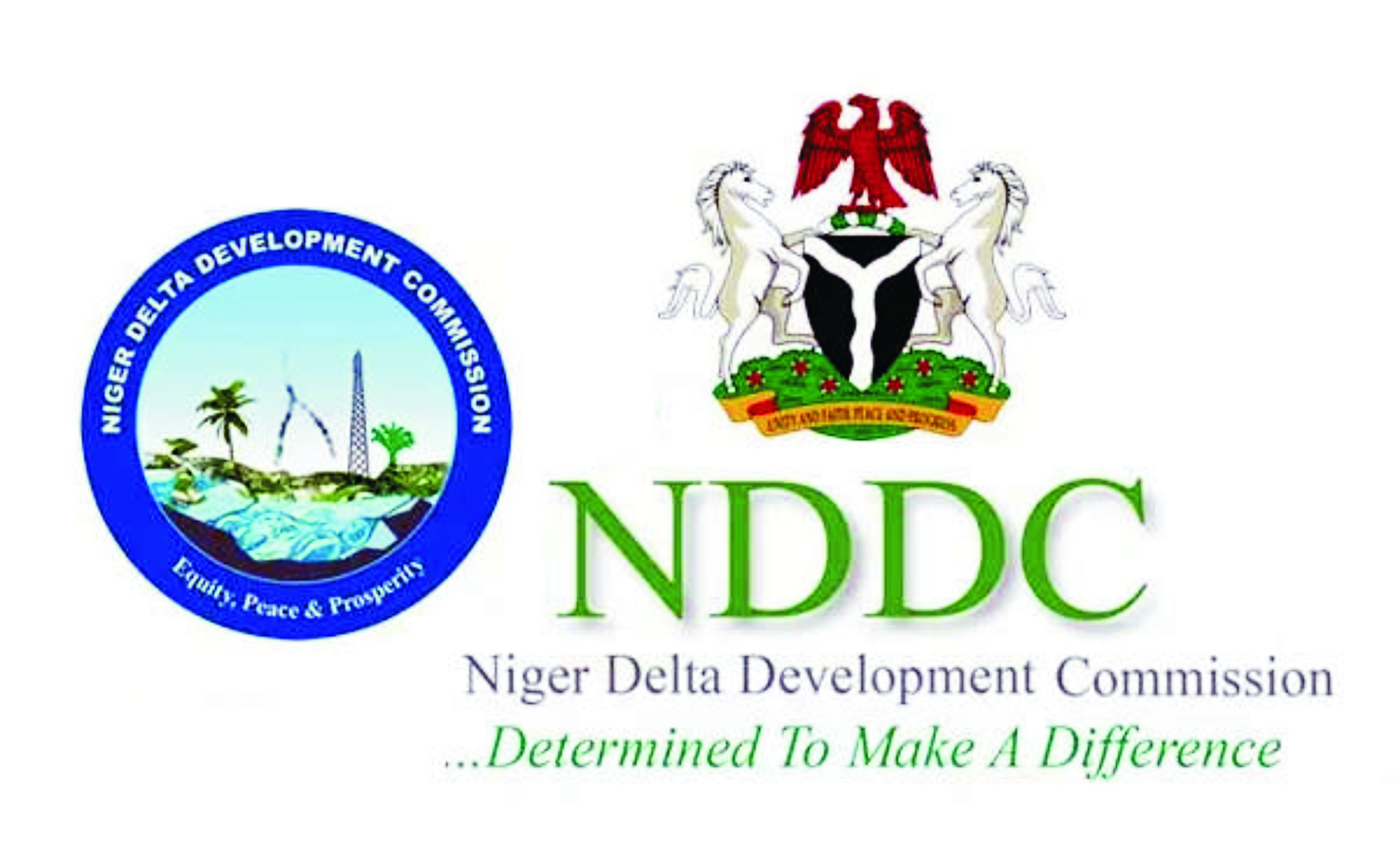Editorial
NDDC Advisory Committee

President Muhammadu Buhari, on March 10, 2020, inaugurated an Advisory Committee for the Niger Delta Development Commission (NDDC) at the Council Chambers of the Presidential Villa, Abuja.
The Committee which was constituted in accordance with the provisions of Part III, Section 11 (1a) of the NDDC Establishment Act (as amended) comprised the nine governors of the Niger Delta region and the Ministers of Niger Delta Affairs and Environment.
According to Section 11 (2) of the Act, the Advisory Committee will have the responsibility of advising the NDDC Board and to monitor the activities of the Commission, with a view to achieving set objectives as well as to make rules regulating its own proceedings.
While inaugurating the Committee, Buhari recalled that his administration had in 2016 launched the New Vision for the Niger Delta (NEVIND) to bring sustainable peace, security, infrastructure and human capital development to the region. He told the governors that the abuses of the past made it necessary for them to demand strict and diligent oversight, henceforth.
The President said that the medium to achieve this important objective was through the Niger Delta Ministry, NDDC and the Presidential Amnesty Programme (PAP). He tasked the members to carry out their new assignment effectively and with utmost diligence, working closely with the relevant ministries, adding that he expected to see positive changes in the affairs of the NDDC and on the ground in the Niger Delta region.
Buhari tried to justify his decision to inaugurate the Committee ahead of the reconstitution of the NDDC board when he said: “This is to enable us develop insights into the affairs of the Commission which will properly guide the board when reconstituted once the forensic audit exercise on the Commission is concluded…”
Responding on behalf of members of the Committee, Delta State Governor and Chairman of South-South Governors Forum, Dr Ifeanyi Okowa, said “We do not want to criticise what has happened in the NDDC for quite some time, but the fact is that co-operation between the states and NDDC has not been strengthened over time and we have various cases of duplication of projects that are not properly planned.
“But I believe with the inauguration of this body, we will be able to sit down, work in collaboration and supportively to bring greater development to our people.”
He thanked the President for constituting the advisory committee and also granting the request of the region’s governors for a forensic audit of NDDC.
Going by the Act establishing the NDDC during the Olusegun Obasanjo administration 20 years ago, the agency has the core mandate to formulate policies and programmes and execute same for the development of the Niger Delta region in the areas of industrialisation, transportation, agriculture, health, housing and urban development, water supply, electricity, telecommunication and employment generation.
Even as belated as the inauguration appears, The Tide commends Mr. President for the bold move, especially considering that the Committee comprises mainly governors of the opposition Peoples Democratic Party (PDP).
Already, and just as Governor Okowa hinted in his speech, there is lack of collaboration between administrators of the regional interventionist outfit and governors of its member-states. And this had resulted in the duplication of efforts, funds misapplication, shoddy jobs and outright projects abandonment.
For instance, here in Rivers State, Governor Nyesom Wike had since berated the NDDC for failing to live up to the expectations of the Niger Delta people. He drove this point home when the former NDDC Acting Managing Director, Professor Nelson Braimbaifa, visited him last year, during which he complained that the Niger Delta states were never involved in the design and siting of projects.
Wike had accused the NDDC of owing his government a refund of the state’s counterpart contribution for the building of the Mother and Child Hospital on which the agency reneged. The state has almost completed work on the project single-handedly.
We also recall the disagreement between the Rivers State Government and the NDDC over the construction of Igwuruta-Chokocho-Okehi Road and the recent sealing-off of the latter’s corporate headquarters over a N50 billion tax debt.
The story is almost the same elsewhere across the region. In Akwa Ibom State, for example, Governor Udom Emmanuel, in 2017, accused the NDDC of poor job execution, project abandonment and distortion of the state’s development master plan.
We believe that with the advisory committee now in place, any incoming board of the NDDC will be better guided in terms of projects selection, design, siting and execution so as to ensure quality delivery and avoid duplication of efforts.
It is also expected that the governors will be in a better position to monitor the progress of any NDDC projects sited in their respective domains.
The 28-kilometre Ogbia-Nembe Road in Bayelsa State will continue to stand out as the kind of high profile projects the Niger Delta region needs at this period. Surely, the N24 billion project, built by the NDDC in partnership with The Shell Petroleum Development Company (SPDC), could not have been a success if the state government had not provided the necessary environment.
Finally, given the years of exploitation, neglect and injustice suffered by the region, we implore the NDDC, its new advisory committee, major stakeholders, foreign donor agencies and interested private sector partners to seize this noble opportunity to begin to collaborate in a way that will bring about a reversal of the present dire circumstances of the people of the oil-rich Niger Delta region of Nigeria.
Editorial
New Federal Varsity In Ogoni

President Bola Ahmed Tinubu has made history by signing into law a bill that establishes the Federal Univer-
sity of Environment and Technology in Ogoni, Rivers State. This significant occasion marks a bold step forward not only for the Ogoni people but also for the Niger Delta region and Nigeria as a whole. It signifies a commitment to education, environmental sustainability, and technological advancement.
For the Ogonis, who have long been impacted by environmental challenges, the university represents a beacon of hope. It is more than just bricks and mortar; it is a symbol of empowerment and a pathway to a brighter future. This development is akin to a seed, planted with the promise of a flourishing harvest of skilled professionals.
The university’s emphasis on environmental technology is extremely important, especially given Nigeria’s climate crisis. Education plays a crucial role in developing sustainable solutions. The institution will provide students with the necessary skills and knowledge to address the environmental challenges affecting the Niger Delta region and beyond. This will have a momentous impact.
Signing the bill, the President praised the Ogoni people’s resilience and unity. He stressed that the institution would mark a “significant milestone in our national journey towards environment justice, education and sustainable development”. Tinubu said the university is a reaffirmation of his administration’s “unwavering commitment to the people of Ogoni, the Niger Delta and the nation as a whole. For decades, the Ogoni people have been at the forefront of fight for environmental restoration and sustainable development, shaping both national and global conversation of these critical issues.
“By signing this bill into law, we are taking a decisive step towards addressing historical grievances and creating new opportunities for learning, growth and prosperity. The university will serve as a centre of excellence, equipping young Nigerians with the knowledge and skill to tackle present environmental challenges, drive clean energy solutions and contribute to our national sustainable economic development.”
We commend President Tinubu for his visionary decision to establish the much-needed institution aimed at fostering development and progress. This initiative is a testament to his commitment to addressing critical social and economic knots and creating opportunities that will benefit the people. The President has laid a solid foundation for sustainable growth while demonstrating a genuine desire to empower and advance the nation’s collective interests.
In addition to his commendable action, we applaud Tinubu for initiating peace talks to bring stability and reconciliation to the troubled area. The decision to engage in constructive dialogue demonstrates a deep understanding of the relevance of inclusive governance and the role of peace in fostering meaningful development. For decades, Ogoni has endured turmoil and neglect, impeding its potential and the return of oil exploration activities.
By opening the door to peaceful negotiations, the President has made a bold and necessary move towards healing fractured relationships and fostering trust among stakeholders. This initiative holds the promise of ensuring that the voices and needs of the Ogonis are heard and respected. We urge all parties involved to seize this golden opportunity for lasting peace and progress. It is only through unity and mutual respect that the full potential of Ogoni, and by extension the nation, can be realised.
As steps are taken to acknowledge and remediate the damage caused by years of oil exploration and production, the Ogonis must reciprocate Mr. President’s gesture by fostering a climate of equanimity and stability. This will ultimately pave the way for the resumption of oil exploration and production. This is not a call to forget the past, but a pragmatic recognition that meaningful change and sustainable development require a collaborative approach.
The Federal Government has a responsibility to ensure that all academic disciplines offered by the new university are fully accredited to maintain the integrity and quality of the school. Without proper accreditation, the institution risks producing graduates who are ill-equipped to compete in the global workforce or contribute substantially to national development. Accreditation serves as a benchmark that ensures programmes meet academic standards and adhere to best practices across various fields of study.
Staff recruitment should be conducted carefully, as the individuals brought into a team can greatly influence an organisation’s performance, culture, and long-term success. The primary focus of recruitment efforts at the university should be on attracting the best candidates who possess the necessary skills, qualifications, experience, and values. Merit should be the guiding principle in decision-making throughout the hiring process, rather than favouritism or personal bias.
For a nation to thrive in the 21st century, a strong higher education system is not only desirable, but essential. Universities serve as the catalysts for innovation, the breeding grounds for future leaders, and the foundations of a knowledge-based economy. The Federal Government must acknowledge this vital role and take intentional actions to properly fund the university in Ogoni and develop infrastructure to ensure it meets international standards. Neglecting this responsibility would put its future prosperity and global competitiveness at risk.
This institution must not suffer the same fate as other federally-owned universities that have been left to decay. That will be a disservice to its purpose and potential. Many government-owned universities in the country have struggled with dilapidated infrastructure, underfunding, insufficient staffing, and interruptions caused by industrial actions due to unpaid wages or poor working conditions. These challenges have led to declining standards in education, putting both students and staff at a disadvantage. The Ogoni University must not be another victim of this worrying trend.
Editorial
HIV, Transiting From Donor Dependence

The initial announcement by United States President, Donald Trump, to cut funding for international
HIV/AIDS initiatives sent shockwaves through the global health community. In Nigeria, a country facing a significant HIV/AIDS burden, the potential consequences were dire. However, the subsequent waiver granted by the administration has provided a lifeline for the millions of Nigerians who rely on the President’s Emergency Plan for AIDS Relief (PEPFAR) for their treatment and support.
PEPFAR has been an important partner in Nigeria’s fight against HIV/AIDS. Since its inception in 2003, PEPFAR has committed more than $7.8 billion to the country, catering to approximately 90 per cent of HIV treatment requirements. With this funding, Nigeria has been able to enhance its HIV prevention, treatment and support services and has witnessed a reduction in HIV/AIDS deaths.
The waiver granted by the Trump administration guarantees that PEPFAR’s life-saving medicines and medical services will continue to reach the needy. Antiretrovirals (ARVs) are the most common type of medicine used to treat HIV and reduce the virus’ spread. Through the provision of ARVs, PEPFAR helps prevent the spread of HIV and enhances the quality of life of those with the condition.
Although Nigeria was recently exempted from the requirement, the signs are evident: the country has to graduate from dependence on donor funds for its HIV/AIDS control programmes. Over the years, partners including the U.S. government have been central to the provision of treatment to people living with the virus. However, it is time for Nigeria to own its national response to HIV/AIDS.
Nigeria’s HIV/AIDS burden remains critical, accounting for 10 per cent of the global total. In 2023 alone, there were 75,000 new infections and 45,000 HIV-related deaths. The battle against Mother-to-Child Transmission remains challenging, with only 35 per cent of the target 75 per cent being met. Nearly 1.7 million Nigerian children have been orphaned due to HIV. Vulnerable populations, especially women and children, continue to disproportionately suffer.
To transition away from donor dependence, a multifaceted approach is necessary. Firstly, the country must increase its domestic financing for HIV/AIDS programmes. This can be accomplished through innovative funding mechanisms, such as leveraging public-private partnerships and exploring local revenue sources. Secondly, the government needs to strengthen its healthcare system to ensure equitable access to testing, treatment, and care. This involves expanding access to antiretroviral drugs, investing in community-based models, and addressing the stigma associated with HIV.
Thirdly, Nigeria must prioritise prevention efforts. This entails promoting condom use, providing comprehensive sexual education, and increasing awareness about the risks and modes of transmission. By focusing on prevention, the country can decrease the incidence of HIV infections and ultimately lessen the burden on its healthcare system.
Finally, Nigeria should develop a sustainable human resource strategy for its HIV/AIDS response. This involves training and equipping healthcare workers, engaging community volunteers, and empowering people living with HIV to advocate for their rights. A well-trained workforce is essential for delivering high-quality services and ensuring the long-term success of the response.
The transition beyond donor dependence is a complex but necessary journey for the country. By increasing domestic financing, strengthening healthcare systems, prioritising prevention, and investing in its human resources, the country can create a sustainable and effective response to HIV/AIDS. Also, the government should consider alternative funding mechanisms, such as increased domestic funding, public-private partnerships, and philanthropic initiatives. The time to act is now, for the well-being of present and future generations.
Nigeria’s National Agency for the Control of AIDS (NACA) has made momentous strides in combating HIV/AIDS, including expanding access to testing, treatment, and education. However, challenges persist, hindering the effectiveness of these efforts.
One major obstacle is limited access to healthcare facilities, particularly in rural areas. This impedes timely diagnosis and treatment, reducing the likelihood of optimal outcomes for those living with HIV. Additionally, stigma surrounding the disease remains a formidable barrier, preventing individuals from seeking testing and care. Inadequate awareness campaigns further contribute to low testing rates and delayed diagnosis.
Addressing these challenges requires concerted action by the government and stakeholders. Allocation of adequate funding is crucial to expand healthcare infrastructure and ensure the availability of essential services. Moreover, targeted interventions to reduce stigma and promote awareness are vital for increasing testing and early detection.
Collaboration between civil society organisations and grassroots movements is also essential for advocating for protection of HIV funding. Advocacy campaigns can mobilise public support and pressure lawmakers to prioritise the fight against HIV/AIDS. By addressing these challenges and ensuring sustainable funding, Nigeria can depend less on donor countries, drastically reduce HIV transmission, and provide the necessary care to those affected by the disease.
Editorial
Israel-Gaza War: Sustaining The Ceasefire

-

 Politics2 days ago
Politics2 days agoLG Autonomy: NBA To Host Talks On S’Court Verdict Implementation
-
Education2 days ago
Council Boss Charges Corps Members To Promote Peace
-

 Sports2 days ago
Sports2 days agoLASG Tasks Officials, Athletes On Maintenance Of Upgraded Sports Facilities
-

 Oil & Energy2 days ago
Oil & Energy2 days agoBenue To Pioneer Gas Production From Coal – NGEP
-

 Rivers2 days ago
Rivers2 days agoCrisis Looms In Emohua Over Land Grabbing Allegation On Awuse
-

 News2 days ago
News2 days agoGunmen kidnap Youth Council President
-

 News2 days ago
News2 days agoOgoniland Varsity’ll Heal Historic Wound, Says TDF
-

 Politics2 days ago
Politics2 days agoAPC Chieftain Hails Tinubu For Sacking Suspended INEC RECs

